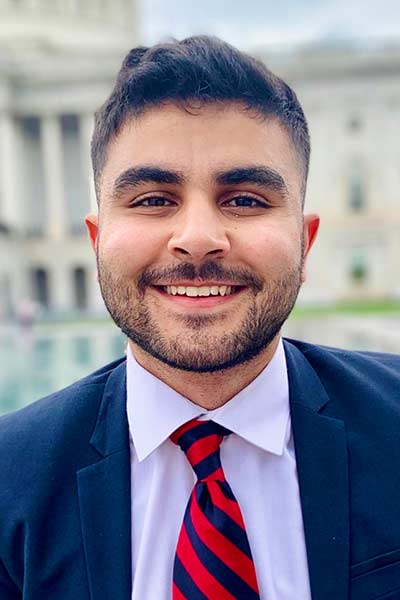Q & A with Hezha Barzani

Name: Hezha Barzani
Majors: Political Science and Homeland Security
Future Goals: International human rights lawyer, then president of the USA
My family's refugee journey, and the countless human rights abuses my Kurdish people have faced and continue to face, led me to studying politics. I hope to use my political science degree to pursue a career in public service, dedicated to fighting against human rights injustices around the world.
Why did you decide to major in political science?
I come from a family of refugees. My parents escaped the Kurdistan Region of Iraq in 1996, as my father's occupation put my family at risk of being killed by the Saddam Hussein regime. My family's refugee journey, and the countless human rights abuses my Kurdish people have faced and continue to face, led me to studying politics. I hope to use my political science degree to pursue a career in public service, dedicated to fighting against human rights injustices around the world.
What was your favorite class that you took in your major? And why?
My favorite class was POLI 351: Governments and Politics of the Middle East with Professor Simon Okoth. As someone who has focused most of my academic and work experience on the Middle East region, this class was by far my most favorite. This was because, being from the Middle East myself, I was able to synthesize my cultural background to the academic side of things regarding Middle Eastern politics.
Who was your favorite professor in your major? And why?
It would be impossible to name just one because of how amazing the political science department is. With that being said, some of my favorite professors are Professors Michael Paarlberg, William Newmann, Charles Turner, Simon Okoth and Chris Saladino. All of these professors were so passionate about what they taught, which made me taking their courses so much more enjoyable.
Can you tell us about the internships you’ve completed?
I have been extremely fortunate to have worked at differing government-related internships during my time at VCU. I have interned for the Atlantic Council, where I currently still work; the U.S. Congress; the U.S. State Department; the Wilson Center; and the Kurdistan Regional Government Representation in Washington D.C. All of these experiences were so valuable to my development as a scholar, as I was able to apply my everyday work experiences to my political science classes and assignments. Furthermore, the skills I have been able to obtain from these internships will without a doubt be so beneficial to me once I enter the workforce.
Can you tell us about a speaker in your major that had an impact on you?
In my comparative politics course, I remember Professor Michael Paarlberg gave the opportunity to Ethiopian students from our class to describe an ongoing situation in the country. This really stood out to me because I was able to learn about a subject-matter from the perspective of actual Ethiopians, not just from text-based reading. Occurrences like this are not rare at all in the political science department, as many professors allow students from differing backgrounds to share their experiences.
Why should students consider political science as a major?
The world revolves around politics. Everything involves politics. Political science is a major that has endless job possibilities, ranging from government-related work to private sector work. Moving away from the jobs perspective, the professors of the political science department are extremely passionate about what they teach. Passion from your professors is crucial, as it allows you to gain a better understanding of that respective subject and makes the class more enjoyable.
Also, political science is unlike any other major at VCU because it can constantly be applied to everyday situations. The curriculums of our classes are always in motion, because history is made everyday. When major breaking news happens around the world and in the U.S., you will be able to immediately use what you have learned through your political science courses to understand and analyze real-world situations.